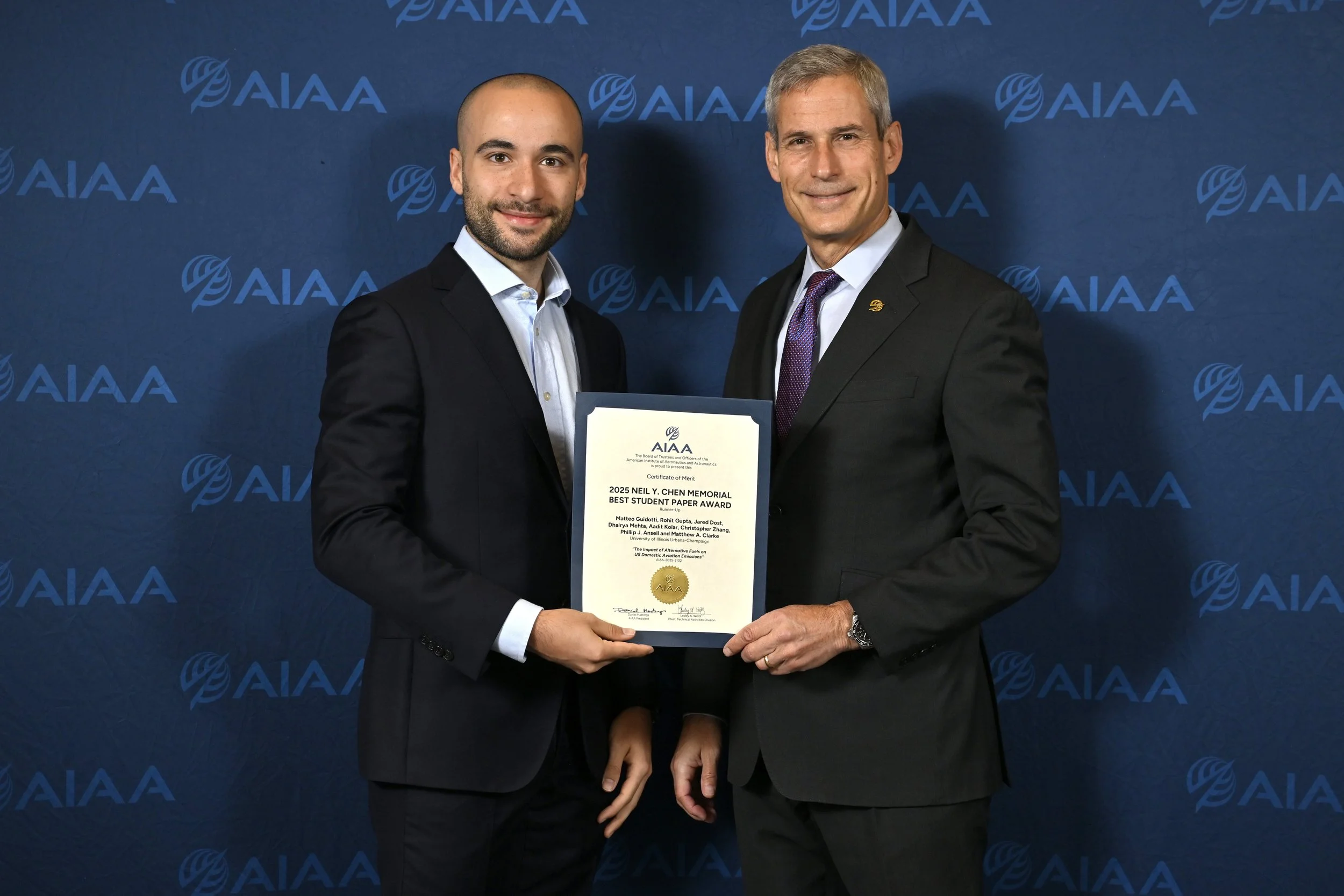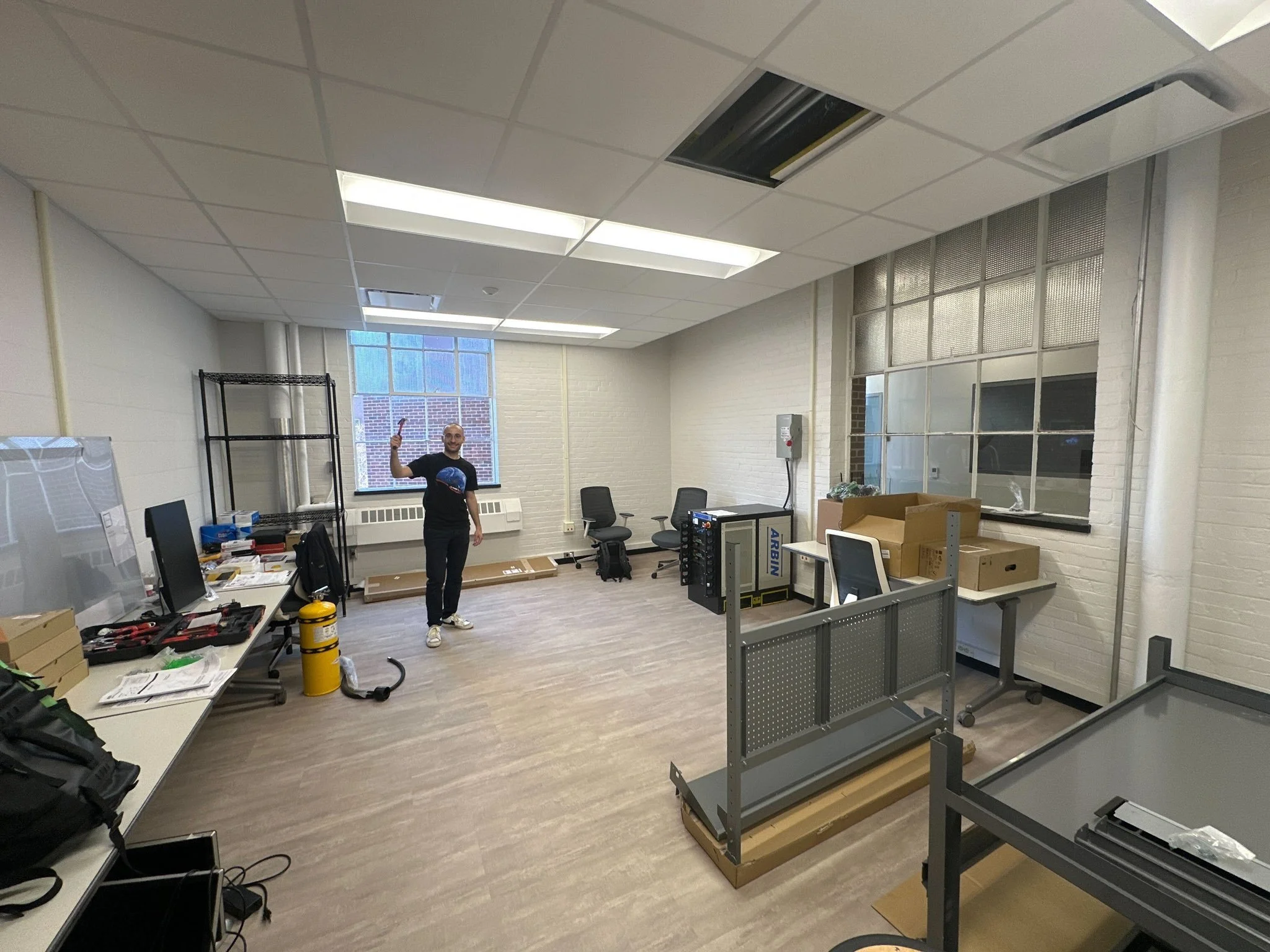
LEADS in the News
Fall 2025: LEADS’ Students place 1st and 2nd in the 2025 AIAA Undergraduate Team Aircraft Design Competition.
Yair Guerrero and Nicole Artemyev place 1st and 2nd, respectively, in the 2025 AIAA Undergraduate Team Aircraft RFP. They worked alongside a team of 9 as leads for Aircraft Structures (Yair) and Aircraft Mass Properties (Nicole) in a semester-long design project course to create a low-cost interceptor aircraft in response to the AIAA RFP.
Fall 2025: LEADS welcomes 2 new graduate students, awarded with GEM fellowship
The LEADS’ laboratory welcomes two new graduate students, Madison Carter and Yair Guerrero, who were recently awarded the prestigious GEM fellowship. As a part of the fellowship, they had the opportunity to intern with top aerospace companies, the Aerospace Corporation and NASA.
Guidotti won the Neil Y. Chen Memorial Best Student Paper Award at the AIAA Aviation Forum and ASCEND 2025 held in Las Vegas this summer. His paper is titled “The Impact of Alternative Fuels on U.S. Domestic Aviation Emissions.”
Urban centers have begun encouraging novel aviation missions to transport goods and people for relatively short distances and at low altitudes over dense populations. These novel aviation missions, known collectively as Urban Air Mobility or UAM, require community consensus and potentially airspace rules in order to enable the scale of operations that are envisioned. Small piloted air vehicles that fly with a few passengers do operate in urban areas today, and these vehicles can be studied as an early proxy for this future UAM traffic. Over 10 weeks, through the GEM fellowship and NASA Ames Research Center, Yair completed a 10-week-long internship over the summer exploring this emerging issue. The work was presented at the Annual Ames Summer Symposium: Link.
LEADS Undergraduate, Nicole Artemyev, was recently awarded the Boeing Sustainable Aviation Scholarship. This scholarship is intended to recognize undergraduate student for their academic achievements and passion for bringing sustainability to the aviation industry.
Spring 2025: Yair Guerrero chosen as Aviation Week 20 for Twenties Winner.
The 20 Twenties Program was established in 2013 to recognize talented individuals on course to change the face of the aviation, aerospace, and defense industry. Every year, Aviation Week Network inducts 20 of the brightest, most driven aerospace-bound STEM students in their 20s into the 20 Twenties program. In Spring 2025, Yair Guerrero, was honored as one of these students and invited to Washington D.C. to speak with
Prof. Clarke was featured in Bloomberg’s Original Electric Vertical Takeoff and Landing (EVTOL) episode, in which he, along with other thought leaders, including Robin Riedel and Bonny Simi, as well as companies such as Archer and Joby, shared perspectives on the future of flight. He highlights how EVTOLS can support urban air mobility, as well as the energy and certification challenges that need to be overcome to achieve sustainable growth. Tune in at 8:30 now here at: Link.
Spring 2025: Matteo Guidotti becomes Ph.D. candidate
In Jan’ of 2025, Matteo became the first student in the LEADS lab to become a Ph.D. Candidate after passing his Qualifying Exam (QE). This was the first time the Applied Aerodynamics and Aircraft Systems (AAAS) QE was offered as a concentration in the AE Department. Matteo was the first student to take this test and pass!
Spring 2024: LEADS Publishes its first paper.
The group's first paper detailing the Thermal Management of Battery-Electric aircraft, submitted to the IEEE Transportation Electrification Conference & Expo (ITEC)! Congratulations to Sai! Read the paper here: Link.
Spring 2024: Construction of the LEADS Lab Begins.
As the lab reaches the midpoint of its first year, graduate students Sai S. and Matteo G. begin constructing a state-of-the-art laboratory fitted for students to improve computational and experimental aircraft design capabilities. This includes the battery testing technology to improve battery models and better inform eVTOLs.
Fall 2023: Prof. Clarke listed in the Forbes 30 Under 30 2024 List for Science.
Prof. Clarke was awarded the Forbes 30 under 30 award in science for the development of a design tool, RCAIDE, used by over 10,000 aerospace engineering professionals, including NASA and Airbus.
Summer 2023: MarketPlace quotes Prof. Clarke on Regional Air Mobility
...“It’s going to take longer in terms of certification, probably 2027 or 2028,” says Matthew Clarke, a postdoctoral fellow in aeronautics and astronautics at MIT. “These conventional electric aircraft will take off first.” Switching out fossil fuels for batteries will already represent a major change for aviation, since electric aircraft will have new propulsion systems and carry batteries on board. Using batteries to get around is a common tactic for building more climate-friendly transit. Electric cars reached about 13% of new car sales in 2022. Buses, trains, and ships could all be powered by batteries, at least in some scenarios. But aviation will have a more difficult time following the same path, largely because batteries are heavy. Every ounce matters for vehicles that need to cruise thousands of feet in the air, and bigger planes traveling longer distances would need bigger, heavier batteries, which is why most efforts in electric aviation so far have focused on smaller aircraft.
Fall 2022: MIT Tech Review quotes Prof. Clarke on Future of Electric Planes
.“It’s going to take longer in terms of certification, probably 2027 or 2028,” says Matthew Clarke, a postdoctoral fellow in aeronautics and astronautics at MIT. “These conventional electric aircraft will take off first.” Switching out fossil fuels for batteries will already represent a major change for aviation, since electric aircraft will have new propulsion systems and carry batteries on board. Using batteries to get around is a common tactic for building more climate-friendly transit. Electric cars reached about 13% of new car sales in 2022. Buses, trains, and ships could all be powered by batteries, at least in some scenarios. But aviation will have a more difficult time following the same path, largely because batteries are heavy. Every ounce matters for vehicles that need to cruise thousands of feet in the air, and bigger planes traveling longer distances would need bigger, heavier batteries, which is why most efforts in electric aviation so far have focused on smaller aircraft.










